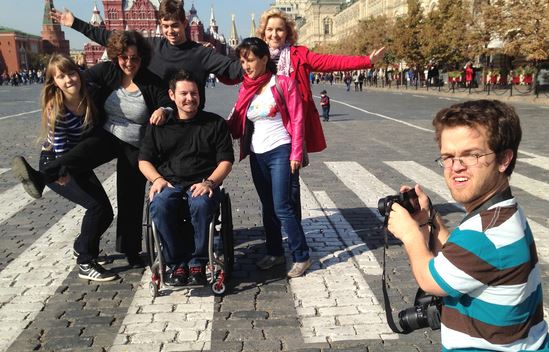Published: 10 November 2014
Countries: US, Russia
 “My name is Jon Novick. I’m 22 years old, and I am a dwarf with achondroplasia,” says the author of the short film Don’t Look Down On Me that has become a Youtube sensation with over 2,6 million hits. Novick’s film, which takes place in New York City, chronicles the backlash he receives daily for his disability. Novick‘s “button camera” which is pinned on his shirt, provides the viewer a chance to understand what it is like to live with dwarfism in a big city.
“My name is Jon Novick. I’m 22 years old, and I am a dwarf with achondroplasia,” says the author of the short film Don’t Look Down On Me that has become a Youtube sensation with over 2,6 million hits. Novick’s film, which takes place in New York City, chronicles the backlash he receives daily for his disability. Novick‘s “button camera” which is pinned on his shirt, provides the viewer a chance to understand what it is like to live with dwarfism in a big city.

Novick is a part of Media Enabled Musketeers, a group of Russians and Americans committed to raising awareness about disability through film. There are almost 50 contributors who want to highlight the prejudices and the challenges they, as people with disabilities, face every day.
“Well, I made the film itself personally out of frustration, as you might imagine. I had moved to New York City, and I had been living here for about a year. And it was just the encounters that I would experience—it’s not something new to me, but what was new was the frequency that it would occur. It would happen almost on a daily basis. And, it would get to a point where I would leave my apartment knowing that I was different, because no one would really let me forget it,” said Jon Novick in an interview with Democracy Now.
Another filmmaker who talked to Democracy Now anchor Amy Goodman was Maryam Magomedova, a Russian from Moscow born with cerebral palsy, who also takes part in Media Enabled Musketeers. Her film, Maryam’s Victory, sheds light on her disability when it comes to walking and her desire to be judged for her talent and not what hinders her. Magomedova currently holds a degree in linguistics and is attending law school in hopes to advocate for people living with disabilities.
Novick’s and Magomedova’s short films, as well as dozens of other documentaries, will be shown at a festival in Moscow, and broadcast over local media and the internet.
Media-Enabled Musketeers is a joint venture between Manhattan-based Downtown Community Television Center (DCTV) and Moscow’s Journalism Advancement and Support Center (JASC). These organizations combined their knowhow and contacts in order to connect two discrete populations across two distinct countries – reporters and people with disabilities in Russia and the US. The goal is not only to help people with disabilities tell their stories through the use of documentary techniques, but also to promote cultural understanding through mutually beneficial cooperation between Russia and the US.